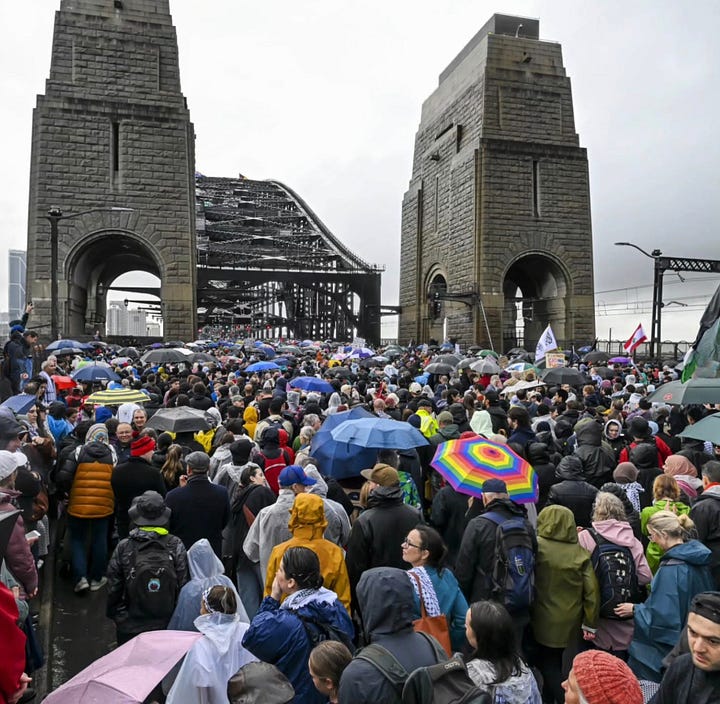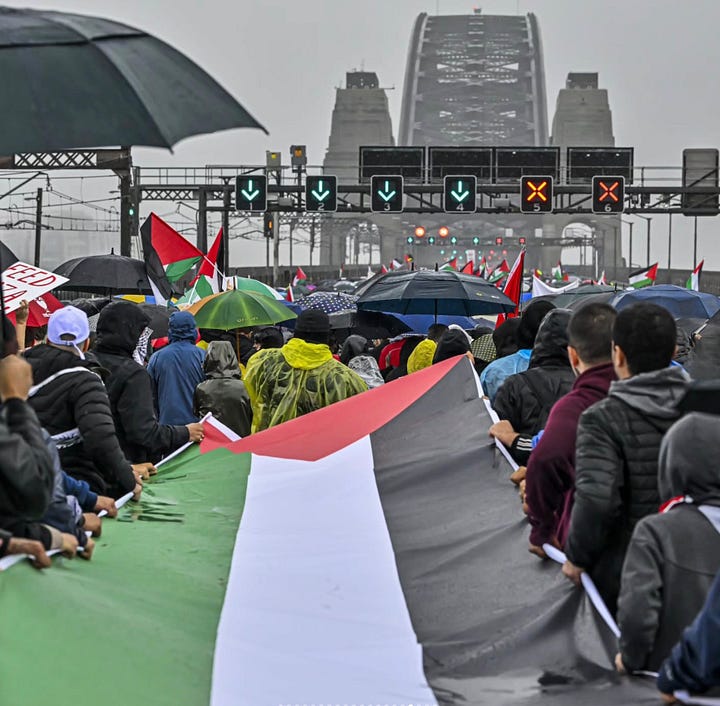Watching the world wake up
The late awakening to Gaza's genocide
Last Sunday, up to 300,000 people peacefully marched across the Sydney Harbour Bridge for Palestine – the largest protest in Australia since the Iraq War demonstrations of 2003.
This felt like a turning point.
It felt like, for the first time, those speaking out against genocide weren’t the minority. Like for the first time in two years, we’d crossed some invisible threshold into mainstream opinion.
I can sense the energy has shifted, especially here in Australia. After years of controversy and complication, it suddenly feels safe to say, “This is wrong. This must stop.” As if the cost of speaking out has lowered. As if there is less at stake, less on the line.
And I don’t know how to feel about that.


It’s a weird feeling, watching the world wake up.
For years, those who dared to speak out were silenced, shushed, or painted as extremists. Terrorist sympathisers. Now the same media, journalists, politicians, and leaders who once dodged the truth or condemned the pro-Palestinian movement are finally calling a thing what it is.
After years of waving conversations away as “too complicated,” suddenly, everyone has a backbone. Integrity. Everyone’s got the language now. Many can still only manage “forced starvation” instead of genocide, but still, the shift is undeniable.
World leaders are finally talking, but their actions are hollow. They release strongly worded statements of condemnation – Bad Israel! – followed by no sanctions, no arms embargoes, no consequences. Words without teeth.
People are finally finding their voice. And yet, nothing is actually being fucking done.
It’s a weird feeling, watching loved ones wake up.
Friends and family who once avoided the subject are suddenly heartbroken by the scenes coming out of Gaza. After years of blissful ignorance. Years of awkwardly changing the subject around me, sidestepping political conversations because they didn’t want to deal with my emotions. Calling me dramatic, too sensitive, woke.
After mindlessly swiping past the videos on social media, telling me it was “too sad.” Now they want to discuss it. Now they post infographics to their stories. Now they say, Maybe this actually is really bad. Maybe you were right.
For so long, I’d felt like I was losing my mind. Feeling like – in my immediate world – I was the only one who cared. Feeling like maybe I was the problem. Like if I were a little less sensitive, maybe I wouldn't care this much.
Now it seems everyone’s feeling it, too.
It’s weird, too, what finally woke everyone up.
Collectively, we decided that hunger is the red line. Ribcages poking against a baby's fragile, skeletal frame is where we say enough is enough.
Never mind the years of carnage we all saw, live-streamed to our feeds, as Israel blew up homes, schools, ambulances, bakeries, hospitals, refugee camps, and safe zones. Never mind the mass slaughter of bodies – trapped under rubble, the makeshift tents set on fire, the emergency ward floors coated with blood. Never mind the countless children left limbless, orphaned, and traumatised.
War crime after war crime.
Again and again.
Somehow, this was the line we simply could not cross.
I don’t know how to feel about that.
On one hand, I feel bitter and resentful.
Starvation is nothing new. Human Rights Watch accused Israel of using hunger as a weapon of war back in 2023.
So, why now? Why two years later?
There's a deep sadness that comes with watching the world wake up. An ache in knowing you were sounding the alarm long before others came running. Liz Plank described it as “the heartbreak of being too right… too early.”
Because now that everyone’s finally coming around – taking a seat at the table – it almost feels too late. There’s an internal frustration I can’t quite let go of toward those who waited until it was safe. Why did so many need to die before your moral compass started to shake?
On the other hand, I feel grateful to all those who speak up.
While the frustration is justified, I fear this movement will splinter if we can’t set aside our righteousness; if we can’t make peace with our anger and, instead, find it in ourselves to welcome everyone – even those who arrive late.
So, I’m choosing to lead with love. With acceptance.
I will welcome the latecomers. Not to excuse silence or ignorance, but because the stakes are simply too high to keep the circle small. Because progress depends not only on the first to arrive, but on every single person who stays.
We do not have the luxury of purity tests when there is a genocide to stop.
The people flooding the bridge last Sunday – some of them were there because their conscience finally kicked in. Others because it felt socially safe to do so. Some because they couldn't ignore the images anymore. And many because they’ve been calling it out from the beginning.
But the reason doesn't matter. What matters is that they showed up.
If we want to build a culture where people engage with the world's problems instead of scrolling past them, we have to get comfortable with people arriving messy, late, imperfect. We have to resist the urge to punish them for not caring on our preferred timeline.
To those joining late: the doors are open. The table is set.
Pull up a chair – you are needed now.



another amazing article 🩷